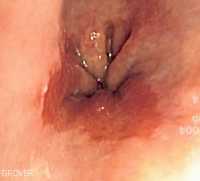
13 Aug Barrett’s Esophagus Probably Comes from Stomach Cells
MedicalResearch.com Interview with:
Dr Lizhe Zhuang PhD
Dr Karol Nowicki-Osuch PhD
Dr. Rebecca C. Fitzgerald MD
Medical Research Council Cancer Unit,
Hutchison/Medical Research Council Research Centre,
University of Cambridge, Cambridge UK

Barrett’s Esophagus -Wikipedia
MedicalResearch.com: What is the background for this study?
Barrett’s oesophagus affects about one out of 100 people in the UK and is thought to be a precancerous lesion of a more deadline cancer, oesophageal adenocarcinoma.
Barrett’s is a condition where the squamous cells in the lower part of oesophagus are replaced by a special type of columnar cells, which look like intestine, a far distant organ, raising a question where are these columnar cells come from.
Many theories have been proposed in the past decades and no agreement was reached, and many conclusions were based on mouse models which do not recap the human condition.
We therefore collected fresh samples of human tissues that correspond to all the possible theories and assessed them all together using state of the art technologies.
MedicalResearch.com: What are the main findings? Is this transition related to reflux or H. pylori?
- Barrett’s oesophagus probably comes from stomach cells
- The transition is mainly driven by two genes called c-MYC and HNF4a. But we did not look at reflux or H.P. (H pylori is negatively associated with Barrett’s and oesophageal adenocarcinoma)
- Barrett’s oesophagus is an indispensable step towards oesophageal adenocarcinoma, even Barrett’s is no longer present at the time of cancer diagnosis.
MedicalResearch.com: What should readers take away from your report?
- To research scientists in the field, we found human samples are sometimes critically important to draw an accurate conclusion. Analysis based on the human esophageal submucosal gland and gastroesophageal junction led us to conclusion that is different from previous studies based on mouse models.
- To general public, all oesophageal adenocarcinoma come from Barrett’s oesophagus – but please note, the overall risk of Barrett’s oesophagus patients progress to cancer is still relative low: about 0.5% per year or 10% patients in their lifetime. Symptoms of persistent reflux and heartburn which are closely associated with Barrett’s oesophagus, should not be ignored.
MedicalResearch.com: What recommendations do you have for future research as a result of this work?
- A reliable human/patient derived model of Barrett’s oesophagus will be very important for future research.
MedicalResearch.com: Is there anything else you would like to add?
- 20 deceased ‘Barrett’s-free’ organ donors participated this study. Their tissues from gastroesophageal tract were collected to represent a group of ‘healthy specimens’ to study what was like prior to the development of Barrett’s. We are grateful to these donors and their families, and Cambridge Biorepository for Translational Medicine (CBTM) for organising the tissue collection.
Disclaimer: Rebecca Fitzgerald is named on patents related to a device called Cytosponge and associated biomarkers that have been licensed by the Medical Research Council to Covidien (now Medtronic). She is a co-founder of Cyted Ltd an early detection company.
Citation:
Molecular phenotyping reveals the identity of Barrett’s esophagus and its malignant transition
BY KAROL NOWICKI-OSUCH, LIZHE ZHUANG, SRIGANESH JAMMULA, CHRISTOPHER W. BLEANEY, KRISHNAA T. MAHBUBANI, GINNY DEVONSHIRE, ANNALISE KATZ-SUMMERCORN, NILS ELING, ANNA WILBREY-CLARK, ELO MADISSOON, JOHN GAMBLE, MASSIMILIANO DI PIETRO, MARIA O’DONOVAN, KERSTIN B. MEYER, KOUROSH SAEB-PARSY, ANDREW D. SHARROCKS, SARAH A. TEICHMANN, JOHN C. MARIONI, REBECCA C. FITZGERALD
SCIENCE13 AUG 2021 : 760-767
[subscribe]
[last-modified]
The information on MedicalResearch.com is provided for educational purposes only, and is in no way intended to diagnose, cure, or treat any medical or other condition. Always seek the advice of your physician or other qualified health and ask your doctor any questions you may have regarding a medical condition. In addition to all other limitations and disclaimers in this agreement, service provider and its third party providers disclaim any liability or loss in connection with the content provided on this website.
Last Updated on August 13, 2021 by Marie Benz MD FAAD
